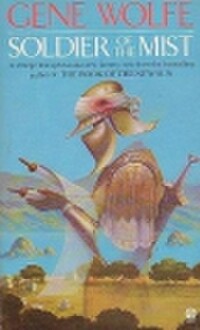“Skinchangers do not eat flesh. ... What they eat is everything that makes a being itself. Their haecceity. Their thisness. Thisness is what they feed on.”[loc. 1052]
In Saint Death's Daughter, Lanie (short for Miscellaneous) Stones spent much of her time in the family mansion, avoiding anything and anyone that might trigger her allergic reaction to violence: when that was taken from her, she found a home above a school in Liriat Proper. In Saint Death's Herald, she leaves Liriat (and most of her found family) behind, determined to fulfill her promise to rescue Sari Scratch's son. Cracchen, possessed by the vengeful spirit of Lanie's great-grandfather Irradiant Radithor Stones (a.k.a. Grandpa Rad), is heading north: Lanie, accompanied only by the gyrgardi (were-falcon) Duantri and by Stripes (an animated tiger-skin rug of great valour), must follow.
Though there are brief interludes recounting the adventures of Lanie's nearest and dearest -- her niece Datu, Datu's father Mak, Duantri's partner Tanaliín -- on their pilgrimage, most of the story focusses on Lanie and her discovery of the wider world. She visits Leech and Witch Queen City, which turn out to be coloniser names for the Free Territories of Taquathura and its capital city Madinatam. She discovers the truth about the flying castles of the sky wizards of Skakmaht, and the chilling way in which they're powered. And though she's lonely and often in peril, her innate compassion and kindness extends even to the most implacable of foes.
Saint Death's Herald picks up where the previous volume of the hopefully-a-trilogy left off: it's definitely worth a quick reread of Daughter to refamiliarise oneself with names and events. There aren't as many footnotes in this volume, and the plot of the novel is at once darker and simpler. I missed Mak (of whom we catch glimpses) and Lir, but found Grandpa Rad's life story tantalising, and the skinchangers fascinating. And I love that, in this cosy-gruesome world, death is a balm, a release, a kindness.
Cooney's prose is an absolute joy. I'm occasionally reminded of Ysabeau Wilce, just for sheer rambunctiousness -- and it's a long time since I've had to look up the meanings of so many words while reading a novel (quop! tholobate! acroteria! anomural! phenocryst! and many many more) which is a pleasure in itself. Looking forward to the next volume...
Thanks to Netgalley and the publishers for my advance review copy! UK publication date is 22nd April 2025.
The poor, mangled bird of his soul. How it had hunched, sullen, glaring at her: wings torn, beak broken, one eye missing, feathers the color of void, smelling of rotten citrus. [loc. 5641]















